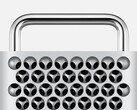The current design of the Apple MacBook Pro 15 has not changed in the last couple of years. It is without a doubt a very good multimedia laptop with a very slim chassis and can still compete with the rivals in 2019. However, we are at a point where the cooling solution cannot really keep up with the increasing performance of the mobile processors.
There has been a lot of criticism when Apple launched the mobile Core i9 processor for the first time last year. The performance was very bad and the devices also got very hot. Apple had to release several major software updates to improve the situation, but the overall CPU performance was still worse compared to the rivals.
Now in 2019, Apple offers the MBP 15 with optional 8-core processors. We have already seen that the cooling solution can handle about 50 Watt from the processor in our previous reviews. According to initial reports (we reported as well) it looks like the performance of the Core i9 is decent this time, and there are even rumors about a voltage reduction by Apple, which only works in macOS. If this is true (as reported), the performance would be worse in combination with Windows (Bootcamp).
We have no sample of 2019 the MacBook Pro 15 with one of the optional 8-core CPUs yet, but an entry-level SKU with the new Core i7-9750H 6-core processor. We checked if there are any improvements.
Our test sample was not provided by Apple; it is a regular retail product from the online shop Cyberport. The CPU performance and the corresponding data are in line with our previous results. The CPU consumes up to 95W for a few seconds, but then quickly drops to 45-50W. This results in a clock of 6x 3.0-3.1 GHz and a score of ~1050 points (CB R15 Multi). this means the i7-9750H is even slightly slower than the i7-8850H from last year's model, both fir short-term as well as sustained workloads. There is another definitive result: The Bootcamp Windows performance is pretty much identical, so we can rule out a voltage reduction of the processor by Apple, at least for our unit.
Note: Many reports show good Geekbench scores. However, this benchmark only uses very short peak-load (few seconds), so Apple devices in particular benefit from the basically unlimited TDP. If a device is limited at 70W, for example, it will get a worse result, even though the overall cooling performance might be better. We will still include the Geekbench results in our final review for the sake of completeness.
So the CPU performance of the MacBook pro stays (even though still at a high level in general) at the lower end of the comparison, also compared to laptops with the same i7-9750H CPU. We have included some models in the following comparison, and you can also see the potential of undervolting in the case of the ThinkPad X1 Extreme and the XPS 15. You can say that many of our test devices with the i7-9750H are about 10% faster.
So what does that mean for the optional 8-core CPUs in the 2019 MacBook Pro 2019? There are multiple scenarios(possible explanations the results so far:
- Apple probably thinks that many users will get an 8-core CPU anyway, so the company does not invest any time in optimizing the regular 6-core Core i7. A voltage reduction could easily improve the performance by 10%, but contrary to a Windows laptop, this is not easy for the user.
- The 8-core processor might actually be better than the 6-core CPU with the same cooling performance. You have to consider that the current Intel architecture consumes a lot of power with high clocks. 8 cores at 2.3 GHz could be cooler than 6 cores at 3.1 GHz, for example. Both the cooling as well as the temperature limit are identical, so the performance would be higher. However, this would also be the case for Windows, which contradicts the reports.
- Apple actually optimizes the 8-core processors via voltage reduction, even though this begs the question if this is the case for both optional models. We do not want to rule it out, but it would take a lot of additional time. Every processor is different, so Apple would have to make sure that the changed values are stable in any circumstance, for every single model.
- Apple sends out special test sample, which might have been tuned manually. This would not be the first time and it is not limited to Apple, either. We are definitely surprised by the fact that the results of the 8-core chip are supposed to be much better compared to Windows.
We cannot give a definitive answer until we get a sample with an 8-core CPU, but one thing is certain: The Apple MacBook Pro 15 can only handle about 50W from the CPU under sustained workloads.
The "small" Core i7 of the entry-level SKU is certainly a powerful processor, especially compared to an older MacBook Pro 15 equipped with a quad-core processor, but other devices still offer more CPU performance.













